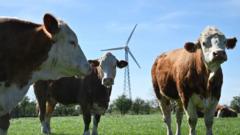Denmark has taken a significant step in climate policy by introducing a levy on livestock emissions aimed at reducing methane pollution. The "Green Tripartite" coalition agreement underscores the nation's commitment to both environmental recovery and agricultural reform, marking a notable shift in land use alongside efforts to enhance biodiversity.
Denmark Introduces World’s First Livestock Emissions Tax to Combat Climate Change

Denmark Introduces World’s First Livestock Emissions Tax to Combat Climate Change
In a landmark agreement, Denmark has agreed to impose a tax on livestock emissions, focusing on methane contributions from the agricultural sector.
Denmark has made headlines by formalizing what is considered the world’s first tax on livestock emissions, specifically targeting the methane produced by cattle and pigs. The agreement, finalized after extensive negotiations involving government officials, agricultural representatives, trade unions, and environmental groups, represents a significant stride towards the country’s climate objectives.
Under the new Green Tripartite agreement, starting in 2030, farmers will incur a tax of 300 kroner (approximately $43 or £34) per tonne of methane emissions, which is expected to increase to 750 kroner by 2035. Jeppe Bruus, the Green Tripartite minister, emphasized the scale of the task ahead, hinting at a transformative approach to land use in Denmark. As part of this initiative, large areas currently designated for agricultural production will be repurposed into forests and natural spaces, aligning with climate goals and biodiversity efforts.
The agreement also aims to tackle nitrogen pollution, with a target of reducing emissions by approximately 13,780 tonnes annually beginning in 2027. Reports from Danish media suggest plans to plant around 250,000 hectares of new forest and restore 140,000 hectares of peatlands to their natural state—an essential step to reclaim valuable carbon storage habitats. Given that around 60% of Denmark's land is cultivated, this initiative signifies one of the most substantial land-use changes since wetlands were drained over a century ago.
Minister Lars Aagaard expressed optimism about the agreement, asserting that it reflects a robust political consensus in the Danish Parliament and highlights effective engagement with affected sectors and environmental advocates. He encouraged global cooperation in climate action, drawing attention to Denmark's model as an exemplar for potential international collaborations.
As Denmark embarks on this ambitious path, it aims not only to fulfill its climate commitments but also to enhance the integrity of its natural landscapes through sustainable agricultural practices and biodiversity recovery. This pioneering legislation may serve as a blueprint for other nations grappling with the challenges of agricultural emissions and climate change.





















